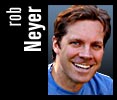 |

|
| Friday, December 6 Thome, Glavine set to challenge Braves' reign By Rob Neyer ESPN.com |
||||||||||||
|
Twelve years. Eleven division titles. That's what the Atlanta Braves have done since 1991, and it's a record that hasn't even been approached, let alone matched, since the leagues split into divisions back in 1969. The Braves have won so many division titles that when you're making your predictions in the spring, you don't have to spend any time at all thinking about the top spot in the National League East. Just write in Braves and move to one of those other, unpredictable divisions. But if the balance of power in the East hasn't completely shifted, it's certainly shifting. Before we go any further, it's probably worth mentioning a few facts:
Which is to say, if we're going to pick somebody else to win the East in 2003, we'd better have some pretty compelling reasons.
Do we? Reason No. 1 is James Howard Thome. If he's healthy, he makes the Phillies between 60 and 80 runs better (yes, all by himself). Let's split the difference, and say Thome improves the Phillies by 70 runs. Last season, they scored 710 runs, good for eighth in the National League. Add 70 to 710 and you get 780, which would have been good for fourth in the league, wedged tightly between San Francisco (783) and Colorado (778), and not far behind the No. 2 Cardinals (787). Ah, but as a number of attentive readers pointed out to me, there's more to this story. The Phillies should have scored more than 710 runs in 2002. Their team OPS was 761, fourth-best in the National League, and if you rank fourth in OPS you should rank better than eighth in runs scored. In fact, based on the official hitting stats except runs, the Phillies "should" have scored approximately 770 runs (and that's actually a conservative estimate). So what happened? They didn't hit in the clutch. With nobody on base, the Phillies batted .266 with a 782 OPS (best in the league). But with runners aboard, the Phillies batted just .250 with a 736 OPS (11th in the league). When a team's clutch stats are significantly worse than their non-clutch stats, all it means is that they probably got stuck with more than their fair share of crummy luck. Assuming that the 2002 Phillies were fundamentally a 770-run team, what happens if you add Jim Thome? Right. You score 830 runs and you lead the league. Granted, the Phils won't have Scott Rolen in the lineup, but they also won't have Marlon Anderson, and if they're smart they won't have Doug Glanville, either (he's a free agent). There's certainly no guarantee that the Phillies will lead the league in runs next season ... but at this particular moment, they do look like the best candidates. Pitching-wise, there's good news and bad news. The good news is that Randy Wolf and Vicente Padilla both pitched particularly well. The bad news is that Brandon Duckworth and Robert Person didn't. The good news is that pitchers are unpredictable. The bad news is that pitchers are unpredictable. The good news is that the Phillies apparently have more money to spend. The bad news is that they're supposedly interested in spending it on a 40-year-old pitcher who throws about 60 miles an hour. When he's good and loose. Reason No. 2 is Thomas Michael Glavine. Formerly of the Braves and currently of the Mets, Glavine's decision to sign with New York presumably wasn't made because he thought his new team would have a better chance to win than his old team, considering that his old team finished 26.5 games ahead of his new team. Glavine will help the Mets. Sure, he's still a fine pitcher (18-11, 2.96 ERA). But he'll be 37 next season and he won't have Leo Mazzone in the dugout or Andruw Jones in center field. But he'll help the Mets, if not as much as they think he will. The problem, of course, is that to this point the Mets haven't done anything to address their biggest problem of 2002, which is that they didn't score enough runs to win. The Mets scored 690 runs -- 13th in the league -- and they scored them on merit. Now, if you're a Mets fan (or Steve Phillips), you can certainly hope that Jeromy Burnitz, Roberto Alomar and Mo Vaughn all play better in 2003, and that's not a completely unrealistic hope. If they do, and if free agent Edgardo Alfonzo returns to the fold, the Mets will score enough runs to be competitive. Sounds like a lot of ifs to me. But of course, the Mets' gain is the Braves' loss. Baseball's a funny game, but is Mike Hampton really going to pitch as well in 2003 as Glavine did in 2002? Baseball's not that funny. Greg Maddux, even if he does come back, won't pitch as well as he did last season. The Braves have gaping holes at first base, second base and third base. They've already lost relievers Mike Remlinger and Tim Spooneybarger, and if they bolster their rotation with John Smoltz, they'll have to find a new closer, too. Twelve years, and 11 division titles. Perhaps it's foolhardy to think the Braves won't make it 12 for 13. That is what I think, though. I don't claim to know who's going to win the East Division. It might be the Phillies or the Mets, or maybe even the Expos (wouldn't that be a story?). Not the Braves, though. They had a good run. But unless John Schuerholz does a lot of good work between now and Opening Day, the run is done. Senior writer Rob Neyer, whose Big Book of Baseball Lineups will be published next spring by Fireside, will be appearing here regularly and irregularly during the offseason. His e-mail address is rob.neyer@dig.com. |
| |||||||||||

